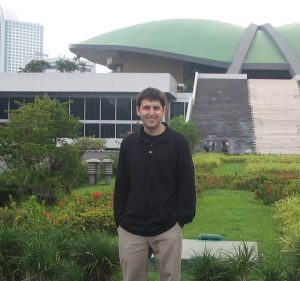Memo #38
Nathan Allen
 Indonesia’s ‘handshake’ controversy made international news last week. To summarize: the Obamas were being greeted by Indonesian officials, and in the process, Michelle Obama shook the hand of an Islamist politician (and Minister of Communications and Information) named Tifatul Sembiring. Sembiring then went on Twitter to explain that the handshake was unwelcome and forced upon him. Video evidence clearly shows he was dissembling.
Indonesia’s ‘handshake’ controversy made international news last week. To summarize: the Obamas were being greeted by Indonesian officials, and in the process, Michelle Obama shook the hand of an Islamist politician (and Minister of Communications and Information) named Tifatul Sembiring. Sembiring then went on Twitter to explain that the handshake was unwelcome and forced upon him. Video evidence clearly shows he was dissembling.
The handshake controversy cements Sembiring as a gaffe-prone politician: he has wise-cracked about AIDS, quipped about ‘unfaithful’ nations, and questioned the religiosity of political allies. His record of bloopers is long and growing.
Sembiring’s saga also underlines continuing tensions within Indonesia’s Islamist political movement. While his gaffes often take on an Islamist tinge, he lacks the record of an uncompromising Muslim hardliner. As President of the Prosperous Justice Party (PKS), now Indonesia’s largest Islamist leaning party, Sembiring helped transform the inward looking network of devout students into an outward looking national force. During campaign media events in the lead up to the 2009 legislative and presidential elections, Sembiring’s easy going, suit-wearing style projected the image of a modern, professional politician.
Muslim activists did not always appreciate Sembiring’s race to the middle public image. During the 2009 presidential campaign, Sembiring gently criticized the public fascination with the jilbab wearing wives of Yudhoyono’s competitors, Jusuf Kalla and General Wiranto. Sembiring’s less than reverential attitude toward an Islamist hot button issue ruffled feathers.
In reaction to his sometimes uneasy relationship with the base, Sembiring occasionally overcompensates. Exhibit A: his legislative campaign paraphernalia. Campaign posters always contained an element of exaggeration, but Sembiring’s very-Muslim campaign poster contrasted sharply with the very-modern TV image.
The handshake controversy fits into a pattern of overcompensation. Shaking hands with women during diplomatic meetings is consistent with Sembiring’s modern professional leanings. But it is the type of action that can draw criticism from an already cautious base. Sembiring’s defence was straight forward damage control.
Islamist politicians frequently walk a tightrope. To attract new voters and conduct the everyday business of governance, politicians must moderate their attitudes and positions. Yet these small compromises can anger the faithful. An Islamist politician who can successfully manage these tensions may one day rule Indonesia. But if handled clumsily and on air, the fumbles can wind up making international news, including on the Comedy Central network.
About the Author:
Nathan Allen – a PhD student in the Department of Political Science at The University of British Columbia. Writing his dissertation on the development of the Indonesian party system.
Links:
- The Colbert Report, November 2010 (Clip 1 of 4)
- The handshake that shook Indonesia, National Post, November 2010
Related Memos:
- Our other Memos about Indonesia and Southeast Asia